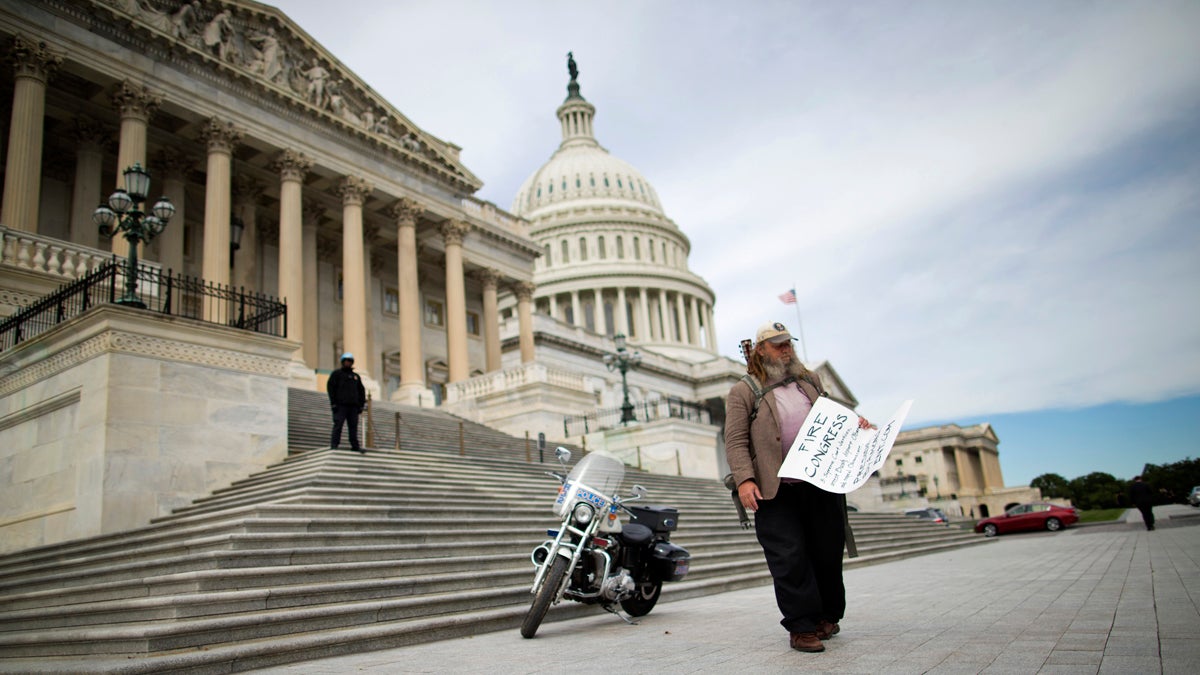Government shutdown is a natural part of a grand old bargaining process

Rick Hohensee of Washington holds a 'Fire Congress' sign near the House steps on Capitol Hill in Washington, Tuesday, Oct. 8, 2013 (Evan Vucci/AP Photo)
Despite the shrieking accusations and opportunistic grandstanding, this government shutdown could one day serve as a textbook example of political bargaining. Perhaps both parties are doing exactly what they need to do. This episode in American history just may be a fascinating demonstration of the legislative capacity of the democratic republic that is the United States of America.
The “power of the purse” is a controversial topic these days. In the Federalist Papers, No. 58, James Madison noted that the House of Representatives was given this power as a “complete and effectual weapon … for obtaining a redress of every grievance …” Historically, however, using the power of the purse in such a dramatic and comprehensive way has not been fashionable.
The intensity of the Republican ethic has prompted House members to vote against seemingly pedestrian funding measures in an attempt to block implementation of the Affordable Care Act. This usage of the power of the purse has now wrought a government shutdown. One reason why this approach is traditionally so uncommon is because constituents generally do not favor a government shutdown, and politicians respond to that. It’s a politically risky move.
Now, many people are looking to place blame. Some blame the Republicans for taking a brazen approach to governance. Some blame the Democrats for taking a cocksure approach to negotiations. Many say both are blameworthy.
However, if you’re interested in keeping your blood pressure at a manageable level, you may want to view this predicament from a new perspective: The government shutdown is due to natural causes. Both sides have acquired substantial amounts of political capital in the form of constituent support for their respective platforms. Now, that capital is being tested in an epic showdown.
Who blinks first?
The fact of the matter is that we do not live in a politically homogenous country. Even within each of the two parties, there are a variety of flavors. We’ve reached the final stages of a natural bargaining process framed by widely dissimilar interests. And while it’s unfortunate for government employees to be caught in this strategic crossfire, we should remember that both parties also have the power to restore normalcy on a whim. The House Republicans could pass a “clean” continuing resolution. The Senate Democrats could agree to pass the narrower funding proposals offered by the House Republicans. These facts indicate that neither side is actually too upset about the current government shutdown. Instead, they both view it as an opportunity to continue trying to out-bid the opposition using what’s left of their political capital from constituent support.
The most important question now is, “Whose political capital will dissipate first?” The answer: It depends on how the dominos fall. Pennsylvania Republicans are already feeling the pressure, and have alluded to supporting a “clean” continuing resolution. However, the Republican Party at large may be willing to withstand the pressure of the shutdown to achieve certain results. Despite previously insisting on completely defunding “Obamacare,” the GOP could very likely settle for narrower concessions, many of which have already been proposed.
If the Republicans can hold the line, various Democrats may succumb to pressure to entertain negotiations. It’s possible that both sides will eventually make concessions and meet somewhere in the middle. Despite the irritatingly drawn-out theatrics, this aggressive and animated bargaining procedure is the natural result of the abundance of political capital on both sides of the aisle. In a sense, we the people have brought this on ourselves. We the melting pot, we the motley crew.
While both parties will continue to hurl hyperbolic insults and fan the flames of constituent emotion in the short-term, it’s worth remembering that in the long-term, both sides are taking a strategically rational approach on behalf of their interests. Ultimately, lack of homogeneity within either party could lead to negotiations and compromise. Is it ironic that our differing opinions could somehow lead us beyond this clash of differing opinions? Or is it simply American? Either way, in the name of civility, let’s keep (relatively) calm as we bargain on.
—
Kevin Brett is a student at Temple University’s Beasley School of Law, where he was selected by a faculty committee for a highly competitive program in Washington, D.C., designed to study the intersection of law and public policy. As a Law and Public Policy Scholar, Kevin completed a white paper analysis of the Jumpstart Our Business Startups (JOBS) Act pertaining to entrepreneurship and securities law while interning with the U.S. Senate.
WHYY is your source for fact-based, in-depth journalism and information. As a nonprofit organization, we rely on financial support from readers like you. Please give today.

